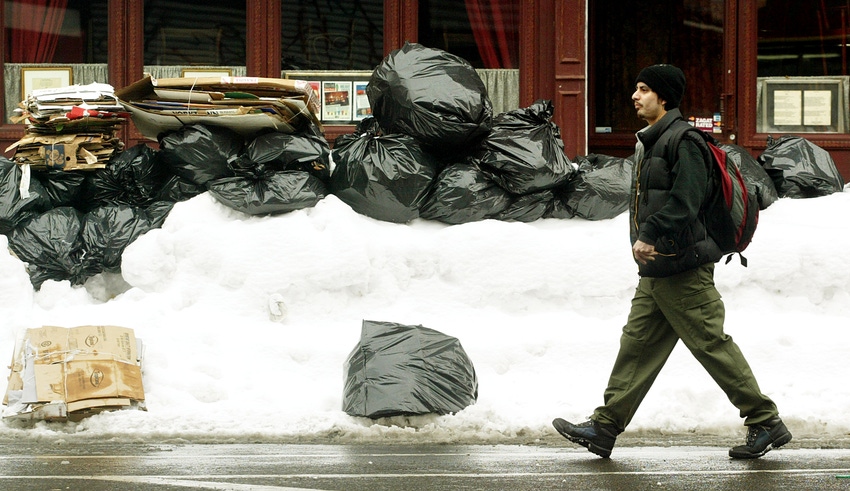From focusing on fleet maintenance to adverse weather training for drivers, getting ready for winter has to be done before the first snowflake falls.

It’s that time of the year again when snow, ice, sleet and subarctic temperatures can wreak chaos on waste collection. Extreme cold weather and storms have already caused reported service disruptions in Salem, Mass., Indianapolis and Gastonia, N.C., just name a few.
Whether it’s announcing a late start to collection or canceling service for one day or more, haulers must weigh customer needs and issues of worker and community safety before making a decision.
This month, Republic Services has had reported service disruptions due to extreme weather conditions. Disrupting collection service is never easy but, in some cases, it’s imperative for the safety of everyone.
“Safety is our top priority as an organization,” says Jim Olson, senior vice president of Republic Services. “That includes the safety of our drivers, the safety of people in the community where we are driving around and also the safety of our customers. In the case of inclement weather, sometimes it does involve not running routes; it can mean delaying start times or not running at all for an individual day.”
Using strategies such as a delayed start time for collection can help for a number of reasons. Often, this allows time for snow plows to work and for roads to be treated with salt and sand, which can increase safety for employees coming to work, as well as making collection safer, says Olson.
For Waste Management, which has also had reported disruptions this month, safety too is a top factor in the decision. “Customer and employee safety is always our highest priority at all times and during severe weather situations,” says Jeff Martin, vice president of safety services at Waste Management.
Once the decision to disrupt service has been made, the hard task is alerting customers. At Waste Management, effective customer communication is key. The company uses various channels, including automated direct customer voice messages, email blasts and media alerts.
Social media offers an immediate way of communicating weather-related disruptions. “In many situations, we use social media tools to assure that local residents can find up-to-date information in the event of service disruptions resulting from challenging post-storm conditions,” says Tiffiany Moehring, a spokesperson for Waste Management. “Once a storm strikes and is severe enough to warrant community updates, [we point customers] to wm.com/alerts for timely information about service.” The company also posts updates on Facebook and Twitter.
Republic Services uses similar push notifications and messages to alert its customers of service changes.
When the storm clears (enough) for service to continue, getting back on track can pose a totally different challenge. “We don’t want people to have the mindset of having to make it all up in a day,” says Olson. “Safety being our top priority, we don’t want people to run over hours, and we don’t want people to rush. There’s a bit of the mentality that ‘it will take as long as it takes to get caught up,’ and we try not to have the divisions get stressed out about it.”
For some areas, making schedule adjustments is essential to restoring order. The National Waste and Recycling Association (NWRA) issued a press release stating, in part:
The National Waste and Recycling Association staff and its members worked with government officials in Massachusetts and New Hampshire to secure an Hours of Service (HOS) waiver following last week’s snowstorm in New England. The winter storm, combined with the shortened-holiday work week delayed waste pickup.
...
The waiver exempts drivers from HOS regulations for the length of declared emergency. However, once the emergency declaration is no longer in effect, drivers must comply with all existing HOS regulations.
NWRA urges its members to operate in a manner that is safe, while also acknowledging the hazard that uncollected waste can pose when it accumulates on sidewalks and public areas.
In the City of Erie, Pa., where recent storms have dumped about 84 inches of snow, cancelling service isn’t always an option. Due to narrow streets and the understanding that customers might not always get or adhere to communications asking them not to put their collection cans on the street, service continues.
“We pretty much need to get it picked up,” says James Depalma, bureau chief, bureau of refuse and recycling for the city of Erie. “It would cause too much of a mess otherwise, and we would have garbage all over the city.” Its strategy is to use pick-up trucks on streets where workers can’t get through because of obstructions and then transfer waste to the collection truck.
“It takes more time and more manpower so we put a couple of extra trucks on the road,” says Depalma. “We tell drivers to take their time trying to get trucks through with ice on the road. We tell them to move slower than normal.”
Winter storms are going to happen, and how haulers deal with them matters. From focusing on fleet maintenance to adverse weather training for drivers, getting ready for winter has to be done before the first snowflake falls.
“I think the key to our success has been that we build winter safety plans in the fall,” says Olson. “Having that pre-planning work done is really important. You’re making a good decision to run or not run because you have the backup plan already worked out.”
About the Author(s)
You May Also Like


